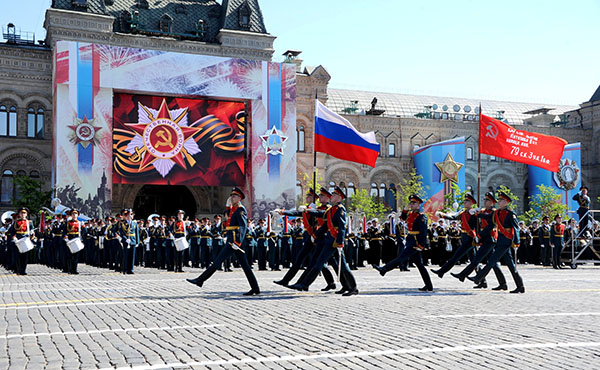
Can a country like Russia, whose population of 143 million is in decline, which has lost a sizeable part of its empire and whose income is falling in line with the price of oil and gas (which Europeans depend on) and other raw materials, really be an enemy for the EU, for the European members of NATO and the US? It is not as though it provides an attractive alternative model, as Soviet communism might once have done for some. The answer seems negative. The situation is entering into a dangerous dynamic, however, buttressed by military logic. And in the military arena, Russia continues to matter.
It is true that Putin’s Russia broke the rules of the game when it annexed Crimea by force and occupied (using troops without an identifying uniform) part of the Ukraine. It has also been ruffling various European feathers with its military operations, and is modernising its armed forces, which some military figures in NATO, and a RAND report, say could not be halted in the event of certain territories in the East being invaded, thereby casting doubt on nuclear dissuasion. Meanwhile (this is not the Cold War) the West needs Russia and Putin to resolve –if indeed it can– or at least straighten out the conflict in Syria and stabilise the situation in the Ukraine.
The NATO summit in Warsaw in July looks set to agree the first permanent deployment of forces in the East –four or five battalions (3,000 to 4,000 troops) in Poland and the Baltic countries –contravening what was agreed with Moscow to put an end to the Cold War and dismantle the Warsaw Pact–. As this blog has pointed out before, in what is known as the Russia-NATO Founding Act of 1997 –prior to the new extensions of the Alliance post-1999– the Western allies committed themselves to not deploying combat troops in any permanent way in territory of the new members, former signatories to the Warsaw Pact, barring a change of circumstances. It may trigger what it seeks to avoid: a hardening of Russia’s stance and a strengthening of Putin.
Fredrik Wesslau and Andrew Wilson of the European Council on Foreign Relations (ECFR) argue that
‘The Kremlin is pursuing an assertive foreign policy in the hope of establishing itself as a great power and securing a sphere of influence over its neighbours. This adventurism will increasingly be driven by a desire to win popularity and distract Russians from economic woes’.
But the report concludes with a ‘paradox’: that a ‘firm response to Russia’s misbehaviour to some extent plays into the Kremlin’s hands’. Although it adds that ‘the cost of accepting Russia’s transgressions would be even greater’.
The deployment, if it finally goes ahead –Estonia is also requesting a Patriot anti-missile defence shield as a dissuasive element– is one way of reassuring the Poles, the Baltic states and other countries of the region who can feel the Russians breathing down their necks and are somewhat lost and disruptive in the EU. But such a move, as already indicated, has its military dimension and could provoke the Russian bear even more. This is why France and Germany are lobbying in the run-up to the Warsaw summit for dialogue with Russia to be reopened by summoning a meeting of the Russian-NATO Cooperation Council, although various member states from the East oppose this. However, while the Secretary General of the Alliance, Jens Stoltenberg, has said in the wake of the recent meeting of Foreign Affairs Ministers that there is ‘broad agreement’ for it among the allies, there are also serious objections. This is without mentioning the reaction that may come from Putin and Moscow, which has already threatened reprisals if the deployment goes ahead.
For its part, in the EU –which has to decide before 31 July whether to renew sanctions against Moscow– the Europeans cannot agree about the language to use on Russia in its new Global Strategy. The one overseen by Javier Solana dating back to 2003, and updated in 2008, is being overhauled by Federica Mogherini, the current High Representative for Foreign Affairs, who in theory is due to present it to the European Council of 28 and 29 June, after the Brexit referendum.
Once again there is the audible sound of the drums of war, not a cold war, but what some such as Alastair Crooke, a British former agent and analyst, call a ‘hybrid geo-financial’ war, which comes in addition to the military escalation. Russia, as a report from Andrew Monaghan of Chatham House points out, is mobilising. Mobilizatsiya, he says, ‘describes a coordinated attempt on the part of the state to address an array of evolving security threats – in both narrow and broad senses – to Russia’, and ‘in part, this reflects a widespread debate about the looming possibility, perhaps even inevitability, of war’. Although as Crooke reminds us, mid-way through April General Alexander Bastrykin, head of Russia’s Investigative Committee, wrote that his country is militarily ill-prepared to face a new war either at home or abroad, and that the economy is in a bad way too. But Monaghan warns against the emergence of an ‘arc of crisis’ around Russia.
Briton Sir Richard Shirreff, who until two years ago was the most senior European general in NATO in his role as Deputy Supreme Commander, has just published a bad novel, 2017: War with Russia, in which he warns of, or rather describes, an armed conflict next year if the current situation persists, something that has irritated the British Foreign Secretary, who has labelled its author ‘irresponsible’.
The West is in a western-style bind: it wants to adopt a strong defensive stance against Russia, but at the same time get on well with Moscow and Putin, at least on some issues. Great diplomatic skill and vision will be needed to square this circle, which involves not getting too distracted from the true threats to Europeans, which emanate more from the South and the Orient than from the East.


